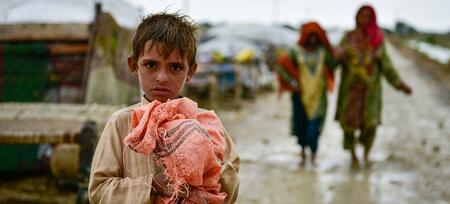
The aid agency surveyed 1,200 households in four provinces worst hit by Pakistan’s devastating floods. Most of the families surveyed have lost their homes and are living in squalid conditions near roadsides, using pieces of cloth or tarpaulin for shelter from the monsoon rain. More than half of those surveyed do not have access to toilets and are defecating outside in stagnant water, which carries a high risk of spreading serious diseases like cholera and dysentery.
The floods have decimated water supplies – 80% of families reported not having enough clean water – and many people have no choice but to drink from unsafe or contaminated water sources. Around one in five households said they were getting water for drinking and cooking from canals, springs, or rivers, most of which have been contaminated by the floods.
Children sleeping outside without shelter or clean drinking water are at serious risk of life-threatening diseases like malaria, dysentery and diarrhea, as well as insect and snake bites, Save the Children warned. Defecating in flooded fields puts them at even greater risk, as stagnant water draws venomous snakes and spiders.
Source: Save the Children







